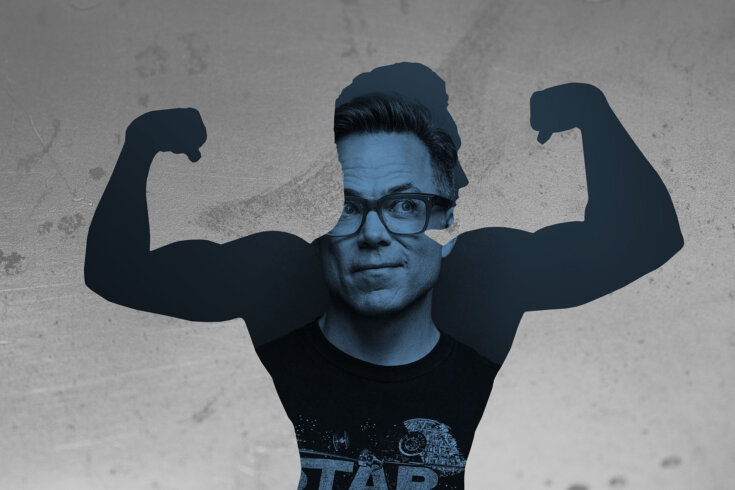My name is Timothy. That’s what is on my birth certificate, driver’s licence, and passport.
But my dear mother called me Timmy. My high school and university buddies called me Timmy. And some of my close friends still, in moments of good cheer, call me Timmy.
Now, however, I’m most often called Timmy by the people who, for various ill-defined reasons associated with my scholarship on misinformation, despise me—that army of trolls, harassers, and hate mailers that populates my social media feeds and inbox.
To give you a sense of the scale of the Timmy-infused derision, I did an analysis of my social media. Specifically, I looked at 1,000 posts on X over a one-year period that had my username and “Timmy.” The result: 999 were insults, and just one was neutral. In other words, if someone calls me Timmy on that platform, the post is almost always (99.9 percent of the time) connected to mockery, hate, and rage.
To be clear, this isn’t lighthearted ribbing. There are calls for my execution (“Did they hang criminals after the Nuremberg trials Timmy?”) and imprisonment (“Timmy belongs in a very nasty prison”). They connect me to numerous dark deeds (“Timmy is an unrepentant mass murderer”), including genocide and treason (“Crimes against humanity has its consequences Timmy”).
Mostly, however, this is about insulting my masculinity. “Timmy Tantrum.” “Come on Timmy Boy, be a man.” “Sweet precious Timmy.” “Hey Timmy my boy……. did you just make wee wee in your tampon????” Etcetera. For this sector of the troll universe, calling me Timmy is, on its own, a mic-drop, argument-stopping insult. Why? Because it is emasculating. Real men ain’t called Timmy.
In many ways, it is amazing that, in 2024, people still think insulting a person’s manliness is a clever and savage putdown. It seems comically regressive, like pulling up in a horse-drawn carriage and calling me a blunderbuss. Of course, mocking someone’s masculinity has been a go-to insult for, well . . . ever. In 1969, US vice president Spiro Agnew called Vietnam War protesters “effete snobs.” And the 1970s “Disco Sucks” movement was, in part, rooted in homophobia and, as summarized by writer John-Manuel Andriote, “a boiling-over of testosterone from white straight men who saw disco—and the whole club scene—as threatening to their masculinity.”
So the concern that masculinity is under attack is hardly new. But in recent years, manly-man rhetoric seems especially intense, as exemplified by the likes of social media influencer Andrew Tate and his embrace of anti-feminist stereotypes, the muscle-bound and steroid-enhanced wellness guru the Liver King and his popular (over 6 million followers on TikTok alone) ancestral manly-man lifestyle, and conservative political commentator Tucker Carlson and his fear mongering about how the decline of masculine men is a global conspiracy to make us more compliant.
The uniformity of my “Timmy” harassment is also an outgrowth of the current manly-men gestalt. Of course, being accused of being less manly is a stinging rebuke, because more manly is always good and less manly is always bad (or so the thinking goes).
The contemporary rise of this manly-man obsession is the result of a complex combination of factors. First, political opportunism and “bromeopathy”-fuelled marketing (to shill, among things, masculinity-enhancing supplements, exercise routines, and extreme diets) creating what has been called the manosphere—a subculture of websites, forums, and influencers championing regressive, misogynistic beliefs. And second, genuine angst and confusion stemming from more inclusive and flexible views of masculinity that aren’t grounded in traditional gender norms. The alpha-male agitprop includes both a questioning of those who don’t present as manly enough (like us Timmys of the world) and, to paraphrase the title of a recent book by the far-right US senator Josh Hawley, claims that traditional masculine virtues are exactly what the world needs right now.
Hawley’s book also underscores the extent to which masculinity has become a part of the current political landscape. Indeed, it has been argued the 2024 US presidential election is going to be, at least in part, a referendum on “the enlightened” masculinity embodied by Kamala Harris and her husband, Doug Emhoff, and the “toxic masculinity” of Donald Trump’s world.
While this take may seem far-fetched and cynical, it is supported by past election experience. A 2021 study from Penn State University found that men’s and women’s endorsement of old-school machismo norms “predicted voting for and evaluations of Trump, over and above political party affiliation, gender, race, and education.” And 2024 research involving Russian men concluded those same norms were “positively associated with attitudes toward repression against political opposition.” Put another way, those who see themselves as manly men are more likely to be pro Putin. And I see this pattern in my Timmy trolls. There is a clear political and hard-right pattern. A large portion of the harassment is often a response to a post about a politicized topic, be it vaccines, climate change, or an LGBTQ+ issue.
All this manly-man noise creates a vicious cycle. The standards being pushed in the manosphere—such as a hyper-muscular physique, playboy lifestyle, and great wealth—are so unrealistic and unattainable in normal life that the social pressure heightens insecurities which are weaponized by politicians, monetized by grifters who peddle (allegedly) masculinity-enhancing products, and exploited by social media influencers. This, in turn, incentivizes more manly-man pressure. It is a classic strategy: create anger and insecurity and then market a solution for that anger and insecurity, be it a pill, a diet, an online community, or a political party.
The pressure is everywhere. A 2022 survey from the UK found that over half of men feel society expects them to “man up” when faced with a challenge, and 34 percent feel that struggling with a mental health issue makes them less manly. In an international survey by Ipsos done for the men’s health initiative Movember, 58 percent of men agreed that “society expects them to be emotionally strong and not show weakness.” A 2017 study by Pew Research Center found that American men faced pressure to be emotionally strong (86 percent), to be willing to throw a punch (57 percent), and to talk about women in a sexual way (45 percent).
To be sure, it is hard to study the actual causal impact of masculinity beliefs on health and well-being. A lot of variables are in play, such as socio-economics, education, cultural background, religion, and geography. Still, the available body of evidence clearly points in the direction of not-so-good.
Studies suggest that adhering to traditional masculine norms can lead to increased risk for cancer and cardiovascular disease; mental health challenges, including depression and suicidal ideation; isolation and loneliness; poor sleep; poor-quality sex; and erectile dysfunction. Manosphere ideals are also linked to domestic violence and negative parenting behaviour. (Is it a surprise that a 2016 study found “women demonstrate a strong preference for a non-traditional partner”?)
Moreover, research also highlights the damaging effects when men feel their masculinity is being questioned. The impact can be relatively benign. Studies have found, for instance, it can cause men to exaggerate their height (by an average of three quarters of an inch), lie about the number of sexual partners they’ve had, and make them more likely to order a steak for dinner.
But the impact can get darker, with a growing body of research showing, to cite just one problematic issue, an increased tolerance for sexual violence toward women. And the overcompensation starts early. A 2024 study from New York University explored how adolescent boys responded to perceived threats to their manhood and discovered a strong link to increased aggression, especially among those “whose parents endorsed hegemonic beliefs about masculinity.” And as noted by the study’s lead author, the negative consequences include what you might expect—sexism and homophobia—but also political bigotry and anti-environmentalism.
There is no doubt that evolving norms—which are moving away from narrow definitions of masculinity, femininity, family, gender, and sexuality—can cause uncertainty, stress, and even anger. Social change, even in a positive direction, can be challenging. And I’m not suggesting there is a right way to be masculine. Many people enjoy or feel more comfortable with traditional masculine norms, however defined. And that’s great. But it seems increasingly clear that the heightened pressure to adhere to the rigid and, let’s be honest, largely mythical notion of masculinity currently pushed in pop culture is not a constructive trend, precisely because there is no right way to be a man.
Not long ago, the American Psychological Association produced Guidelines for Psychological Practice with Boys and Men. The document is designed to help shape both clinical practice and policy development around issues of masculinity. It suggests it is best to encourage messaging that helps individuals “navigate restrictive definitions of masculinity and create their own concepts of what it means to be male.” In this age of manly-man nonsense, this recommendation seems increasingly relevant and helpful.
No to rigid and regressive definitions. Yes to finding your own unique and authentic path forward.
And what of my trolls? For me, the nickname Timmy has always been linked to friends, family, and happy times. So, dear haters, bring on the Timmys!





